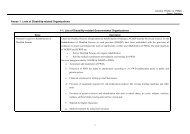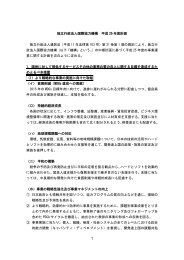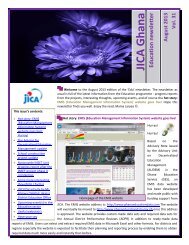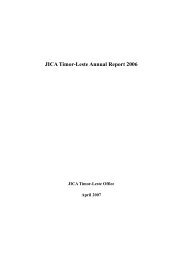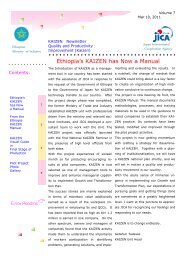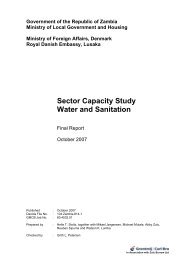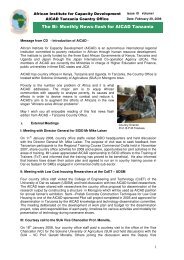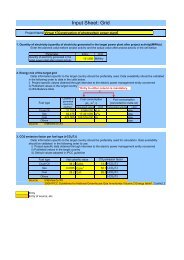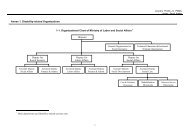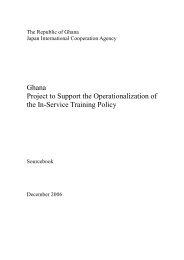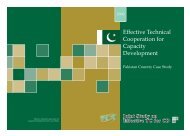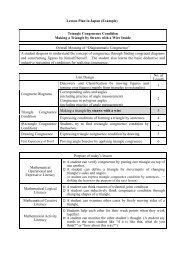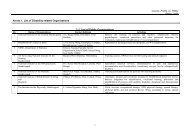Follow-up Cooperation (PDF/123KB) - JICA
Follow-up Cooperation (PDF/123KB) - JICA
Follow-up Cooperation (PDF/123KB) - JICA
You also want an ePaper? Increase the reach of your titles
YUMPU automatically turns print PDFs into web optimized ePapers that Google loves.
<strong>Cooperation</strong> Modality<br />
<strong>Follow</strong>-<strong>up</strong> <strong>Cooperation</strong><br />
<strong>Follow</strong>-<strong>up</strong> <strong>Cooperation</strong> Adds<br />
—<br />
Value to Projects<br />
Post-Project S<strong>up</strong>port<br />
<strong>Cooperation</strong> projects conducted by <strong>JICA</strong> are completed after<br />
a predetermined period. <strong>JICA</strong> carries out ongoing monitoring<br />
after a project has ended to assess the partner country’s selfhelp<br />
efforts in maintaining and enhancing the results of the<br />
project. <strong>JICA</strong> also provides indirect s<strong>up</strong>port and s<strong>up</strong>plementary<br />
s<strong>up</strong>port when necessary. Such s<strong>up</strong>port is referred to as<br />
“<strong>Follow</strong>-<strong>up</strong> <strong>Cooperation</strong>,” which may be broadly divided into<br />
two categories.<br />
1. <strong>Follow</strong>-<strong>up</strong> <strong>Cooperation</strong> to Solve Problems with<br />
Facilities and Equipment<br />
This type of cooperation involves working with the partner<br />
country to solve problems that may have arisen with facilities<br />
constructed by or equipment provided through Japan’s<br />
cooperation projects. Such problems can occur owing to a<br />
variety of factors, including damage caused by natural<br />
disasters, a shortage of financial resources in the partner<br />
country due to a worsening economic situation, or problems<br />
with the use and maintenance of the facilities or equipment.<br />
In Uganda, for example, Grant Aid was extended between<br />
2003 and 2004 to build hand pump facilities for a safe water<br />
s<strong>up</strong>ply in 116 locations in the country and procure necessary<br />
operation and maintenance equipment. Although the Ugandan<br />
government and people have effectively used the facilities<br />
paying due attention to maintenance, some of the facilities<br />
malfunctioned because of aging and other reasons. Water<br />
s<strong>up</strong>ply facilities are essential to the daily life of the people and<br />
immediate repair was needed. However, the Ugandan<br />
government was unable to conduct necessary rehabilitation<br />
work through their own self-help efforts. Therefore, <strong>JICA</strong><br />
decided to implement <strong>Follow</strong>-<strong>up</strong> <strong>Cooperation</strong> to undertake<br />
urgent repairs of the facilities and provide repair tools.<br />
Moreover, to ensure more effective operation and maintenance<br />
of the facilities, <strong>JICA</strong> also provided s<strong>up</strong>port for a workshop to<br />
raise awareness of the water sanitation committee consisting<br />
of community residents, who are responsible for daily care of<br />
the facilities, concerning the importance of regular<br />
maintenance. In addition, <strong>Follow</strong>-<strong>up</strong> <strong>Cooperation</strong> also covered<br />
training for hand pump mechanics. Japan Overseas<br />
<strong>Cooperation</strong> Volunteers (JOCV) serving in Uganda as a “Water<br />
Security Action Team” also joined these activities to help local<br />
residents acquire repair skills for hand pump facilities, which<br />
contributed to enhanced sustainability of the effectiveness of<br />
the cooperation.<br />
As a result of this <strong>Follow</strong>-<strong>up</strong> <strong>Cooperation</strong>, all the facilities<br />
now function properly and operation and maintenance systems<br />
have been strengthened. The Ugandan people now enjoy a<br />
stable s<strong>up</strong>ply of safe water, which is indispensable to their<br />
everyday life.<br />
2. <strong>Follow</strong>-<strong>up</strong> <strong>Cooperation</strong> to Expand Project Benefits<br />
Another type of <strong>Follow</strong>-<strong>up</strong> <strong>Cooperation</strong> is the provision of<br />
additional s<strong>up</strong>port to the partner country to add new value to a<br />
completed project or training program in line with the project<br />
goal, thereby promoting and expanding the benefits that accrue<br />
from a project.<br />
In China, for example, <strong>JICA</strong> implemented the Project for<br />
Surveillance and Control for Vaccine-Preventable Diseases<br />
between 2006 and 2011, as part of cooperation to s<strong>up</strong>port<br />
countermeasures against infectious diseases (‘surveillance’<br />
here means researching and aggregating the occurrence of<br />
infectious diseases). Aiming at raising the quality of protective<br />
vaccination, the project s<strong>up</strong>ported integrating three documents<br />
(Pregnant Woman’s Notebook, Infant Health Notebook, and<br />
Vaccination Certificate), formerly issued separately under the<br />
jurisdiction of different ministries, into the “Mother and Child<br />
Health Handbook” along the lines of Japan’s similar concept.<br />
The handbooks were distributed at a pilot project site, Nanfeng<br />
County, Jiangxi Province. In March 2013, approximately one<br />
year after completion of the project, <strong>Follow</strong>-<strong>up</strong> <strong>Cooperation</strong> was<br />
extended to hold a workshop with the aim of (i) confirming the<br />
degree of change in the health consciousness in the population,<br />
in mother and child health services, and in the use of the<br />
Mother and Child Health Handbook, and (ii) seeking to further<br />
disseminate the outcomes of the project. The workshop<br />
revealed that, after project completion, some 6,700 handbooks<br />
had been distributed to new mothers. It was also confirmed<br />
that the rate of health check-<strong>up</strong> frequency as well as the level<br />
of health consciousness among pregnant women had risen and<br />
Mechanics learn how to repair hand pumps used to s<strong>up</strong>ply water. (Uganda)<br />
Mothers and their children receive health check-<strong>up</strong>s using the “Mother and Child<br />
Health Handbook.” (China)<br />
132
that information sharing among medical institutions was<br />
promoted. On the other hand, some challenges were recognized<br />
in the workshop. They included the case where handbooks<br />
were not distributed to intended mothers and the observation<br />
that mothers tend to feel an excessive burden in filling out the<br />
handbook. By holding the workshop, all the stakeholders in<br />
Nanfeng County, Jiangxi Province, reaffirmed their intention to<br />
work together to address these challenges from the users’<br />
viewpoints and further bolster efforts for protecting the health<br />
of mothers and children.<br />
<strong>JICA</strong> Kansai (formerly called <strong>JICA</strong> Osaka) conducted a<br />
training course on Capacity Development for the Trade<br />
Promotion between Central America and Caribbean Countries<br />
and Japan over a six-year period between 2006 and 2011. The<br />
training course aimed at s<strong>up</strong>porting the participants (typically<br />
staff members of Trade and Investment Center in charge of<br />
export promotion in their countries) to analyse Japan’s food<br />
market and formulate export strategies to Japan so that they<br />
can contribute to facilitating the entry of food-related<br />
companies in their countries into the Japanese food market.<br />
One of the distinctive characteristics of this training course was<br />
that, as one of the final goals after the training, it aimed to<br />
achieve participation in FOODEX JAPAN (Japan’s largest<br />
specialized annual food and beverage exposition) by the foodrelated<br />
companies in participants’ countries.<br />
<strong>JICA</strong> implemented <strong>Follow</strong>-<strong>up</strong> <strong>Cooperation</strong> in the Dominican<br />
Republic and Nicaragua to help the ex-participants in the<br />
training course to conduct export promotion activities for local<br />
companies. In February 2013, Japanese instructors<br />
accompanied these participants to the local companies they are<br />
in charge of and gave advice on handling products and their<br />
production facilities. In addition, the Japanese instructors<br />
participated in a seminar on export promotion to Japan and<br />
explained the characteristics of the Japanese food market,<br />
particularly regarding preferred taste and packaging, to the<br />
participants from local food companies.<br />
As a result of this cooperation, four food companies from<br />
the Dominican Republic succeeded in exhibiting their products<br />
at the FOODEX JAPAN 2013 for the first time from this country.<br />
In the Central America and the Caribbean region, the<br />
momentum for export promotion to Japan is now growing.<br />
S<strong>up</strong>port for Alumni Associations of Former Training<br />
Program Participants<br />
<strong>Follow</strong>-<strong>up</strong> <strong>Cooperation</strong> also includes s<strong>up</strong>port for alumni<br />
Japanese instructors hold a seminar on how to export products to Japan. (Dominican<br />
Republic)<br />
associations for ex-participants in <strong>JICA</strong>’s Training and Dialogue<br />
Programs in Japan. Since the program’s establishment, <strong>JICA</strong><br />
has hosted in Japan more than 290,000 training program<br />
participants from developing countries. These participants will<br />
play a key role in the future development of their respective<br />
countries while also functioning as “important human assets”<br />
that serve as bridges connecting Japan with many countries<br />
around the world. To maintain and develop friendships with<br />
these ex-participants, who have gained a positive understanding<br />
of Japan, as well as to s<strong>up</strong>port the ongoing enhancement of the<br />
skills and knowledge they acquired in Japan, <strong>JICA</strong> s<strong>up</strong>ports the<br />
formation and maintenance of alumni associations of exparticipants<br />
in their home countries. As of 2012, there were 130<br />
such alumni associations around the world.<br />
At many of these alumni associations, participants returning<br />
from training programs in Japan serve as instructors at study<br />
sessions and share their knowledge of <strong>JICA</strong> activities in their<br />
home countries and the results of their own training through the<br />
alumni association’s website, newsletter or annual meetings.<br />
<strong>JICA</strong> collaborates with these alumni associations, which it<br />
recognizes as valuable human assets, to further enhance the<br />
effectiveness of its cooperation projects.<br />
For example, <strong>JICA</strong> s<strong>up</strong>ports the alumni association in Iraq,<br />
whose main activity is to hold local seminars in <strong>JICA</strong>’s priority<br />
assistance areas, such as infrastructure development, private<br />
sector development, and strengthening of governance. Exparticipants<br />
serve as lecturers in these seminars and promote<br />
information sharing and collaboration among relevant<br />
stakeholders. As Japanese nationals’ field of activity is limited<br />
due to security reasons, ex-participants play critical roles in<br />
s<strong>up</strong>porting <strong>JICA</strong>’s activities by visiting and collecting information<br />
at <strong>JICA</strong> project sites in addition to their ordinary workplaces. In<br />
March 2013, the alumni association held its first photo<br />
exhibition with s<strong>up</strong>port from the Department of Literature of<br />
Baghdad University. The aim was to introduce <strong>JICA</strong>’s activities<br />
in Iraq and Japanese culture to the Iraqi people. The photo<br />
exhibition was a great success, attracting a wide range of<br />
participants including university teaching staff and students as<br />
well as government officials. The story of the exhibition was<br />
covered by the national newspaper, which provided an excellent<br />
opportunity to introduce <strong>JICA</strong>’s activities throughout Iraq.<br />
<strong>Follow</strong>-<strong>up</strong> <strong>Cooperation</strong> helps to extend and enhance the<br />
results of past cooperation projects over longer time periods,<br />
thereby increasing the effectiveness and quality of Japan’s<br />
international cooperation efforts.<br />
Opening ceremony of the <strong>JICA</strong> alumni association photo exhibition in Baghdad (Iraq)<br />
Program Goals and<br />
Special Feature Overview Concrete Initiatives <strong>Cooperation</strong> Modality<br />
Operation, Management<br />
and Evaluation Data and Information<br />
133



